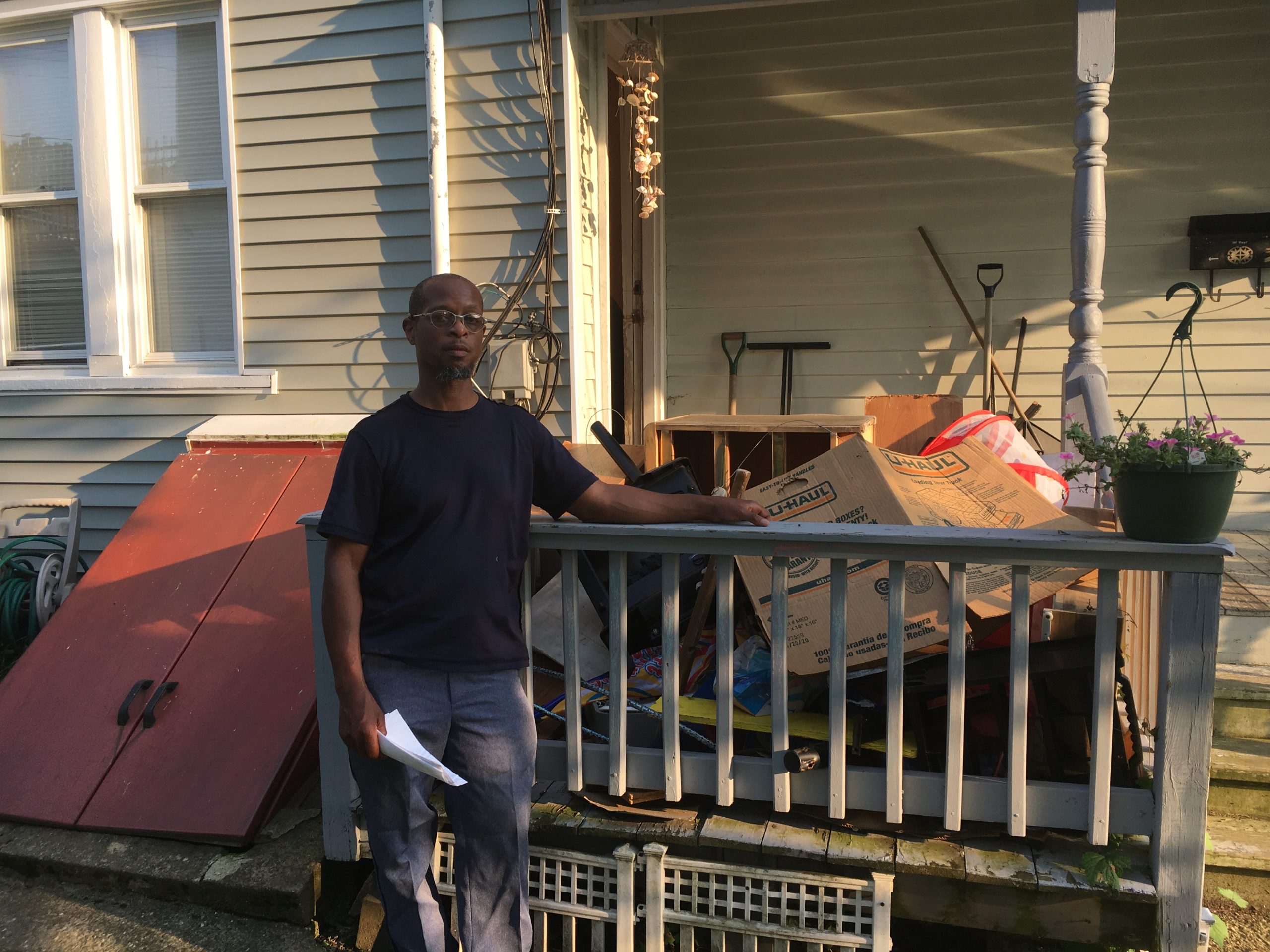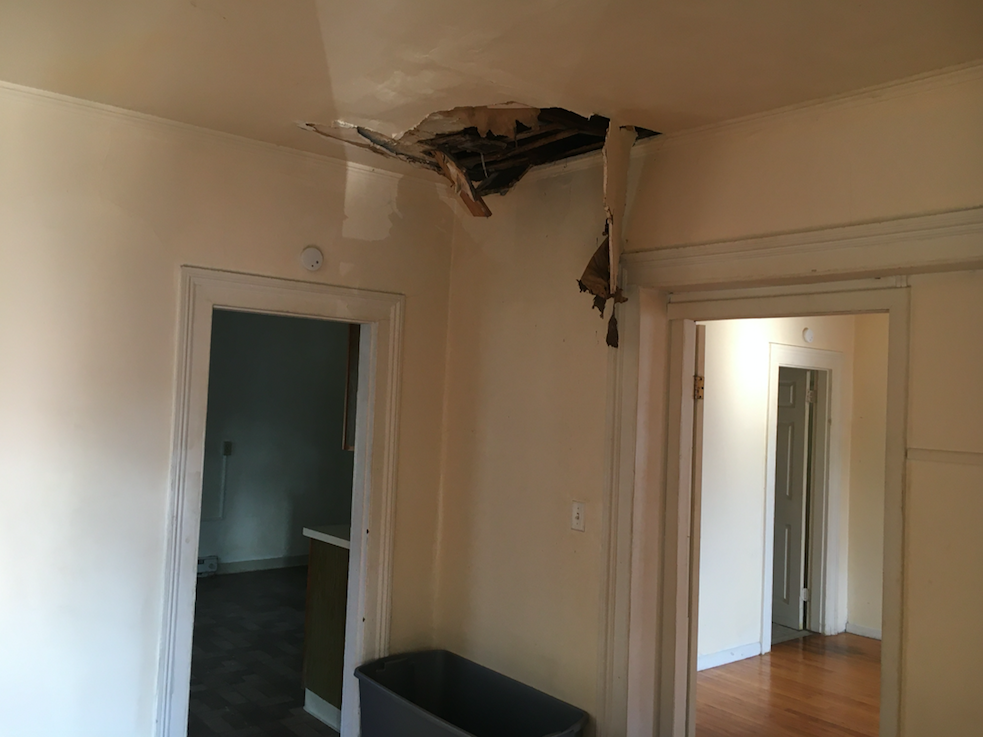**This is the first of a three-part series looking at the eviction moratorium’s effect on rental property owners. Read the second installment here and the third installment here**
When Alvin Blount, a 56-year-old postal worker from Naugatuck, and his wife decided they wanted to invest in a rental property as part of their retirement nest-egg, they never thought they would spend the next year of their lives in a legal morass losing tens of thousands of dollars.
Although Alvin originally planned on purchasing property in South Carolina, the couple eventually decided it was too far away and instead purchased a two-apartment house just a couple miles from their home in Naugatuck in June of 2020.
Part of the purchase agreement was that the existing tenants would move out. The tenant on the bottom floor honored that agreement shortly after the purchase of the property; the tenant on the second floor, however, refused.
There was little Alvin could do over the tenant’s refusal to move. In the midst of an unprecedented COVID-19 pandemic, both Gov. Ned Lamont and the federal government had issued a moratorium on evicting renters who had fallen behind on payments.
“We figured, okay, that’s decent enough, how long could it last? We can’t back out now,” Alvin said, standing in the vacant first-floor apartment on July 15, 2021 – just fifteen days after the state’s eviction moratorium was replaced with a new executive order requiring landlords to apply for federal funds before moving forward with eviction.
But there were early signs of trouble for Alvin. Already the second-floor tenant – identified as Mary – had created some problems for the new property owner.
According to Alvin, the realtor had to call the police to get Mary to let the building inspector inside, and the first-floor tenants, before they moved out, said there was water leaking through the ceiling.
Alvin hired a plumber who found the pipes clogged with children’s toys and garbage.
Now, the outside of the house is littered with garbage, used mattresses and box springs and discarded furniture. Although Alvin has paid workers to come clear off the property several times, the garbage keeps piling up.
Inside, several flooding incidents from the second floor caused a collapse of the drywall ceiling in the first-floor apartment. Alvin believes the flooding is intentional, showing a picture of when Mary ran a hose out of the second-floor window and continuously ran water into the yard.
On top of that, Mary didn’t pay rent for eight months, from June 2020 through February 2021, a $6,000 loss for Alvin who is paying a mortgage for the property. The bottom floor remains vacant. He fears repairing the ceiling damage before he can get Mary to move out.
During the winter, Mary didn’t pay the oil bill and eventually ran out of heat and hot water, causing the pipes to freeze and break. At the city’s urging, Alvin paid for an oil delivery even though Mary was responsible for her own utilities.
Alvin has pictures from inside the second-floor apartment, from the time he was allowed inside with repairmen to replace the refrigerator, stove and do electrical work. The top of the refrigerator is covered in dead cockroaches, the floor moldy and littered with trash.
Yankee Institute reached out to the electrical contractor and the exterminator hired by Alvin, both of whom confirmed that the conditions of the apartment were “deplorable.” Both said they would never return to the apartment but expressed deep concern for the young children living there.
Alvin says he’s contacted the Department of Children and Families over the conditions of the apartment. “Everybody looks at it as a civil matter and I’m just trying to get rid of her,” Alvin said. “I call because I don’t want that on me.”
“People can just turn around and say, oh the landlord is just a slumlord,” Alvin said. “I can’t be responsible when I’m hiring people to clean these things, do an extermination, and then she refuses to clean anything.”
Alvin took the matter to the court system, filing a three-part nuisance complaint in November of 2020.
Mary did not appear in court or respond to the complaint, so the judge ruled against her and ordered that she could be evicted. Mary, however, then contested the order and the case was reopened.
In February, Alvin and Mary entered into a mediated agreement in which she would pay $750 per month in rent through June of 2021, at which time she would move to another apartment.
Standing on his property in mid-July, however, Mary is still occupying the second-floor apartment. Alvin has never recovered the rent, and he estimates the damages to his investment property are in the tens of thousands of dollars.
Alvin says he has reached out to the Naugatuck Mayor’s Office, has written emails to Gov. Lamont and tried to contact various newspapers. The only response he received was a letter from the Borough of Naugatuck’s Blight Officer regarding complaints from neighbors over the garbage piling up outside the house.
Reached by phone, Mary says that she is trying to move and is currently in a “program” to help her find new housing. She also says she has a heart condition and a child who is blind, which further exacerbates her ability to relocate.
Mary acknowledges that Alvin has fixed some things in her apartment, including a broken pipe and replacing the refrigerator and stove.
“There are no apartments at all,” Mary said. “When I knew they were going to sell the house I was already looking, but I couldn’t find anything in my price range, and I recently got accepted into a program that’s going to help me.”
Mary says that up until Alvin took ownership of the property, her sister had been living with her and helping pay rent, but her sister passed away, leaving her to cover the $750 rent for the two-bedroom apartment alone.
Regarding the trash outside the house, Mary acknowledges that “some of that stuff” on the porch is hers. “Where am I supposed to put stuff? I’m supposed to move out. I don’t know.” She also acknowledges that her apartment has flooded at times and says it’s because of bathtub leaks and problems with the flooring.
“It’s so frustrating to me, because I’m just trying to keep everything calm and nice or whatever,” Mary said. “I feel bad for the guy, but I’m not putting my three children in a shelter if I can help that and people should understand that.”
Eviction moratorium hit small landlords hardest
The eviction moratorium during the COVID-19 pandemic called into question property rights and the role of government intervention into private contracts between renters and landlords.
On the surface, the order made sense: The government had shut down a massive number of businesses and put hundreds of thousands of people – largely workers in low-wage jobs and small businesses – out of work. Allowing them to be evicted in the middle of public health crisis because they suddenly had zero income through no fault of their own would create a housing crisis and a social and political nightmare.
Of course, it wasn’t just Connecticut that issued such a moratorium. There was also a federal eviction moratorium, but the federal moratorium was more restrictive on tenants requiring them to take the initiative to provide their landlord with a signed declaration attesting they have lost income due to COVID, could possibly become homeless and have made their best effort to get government assistance.
Connecticut’s moratorium on evictions was automatic, essentially just denying property owners the ability to evict based on nonpayment.
Connecticut still allowed an eviction under certain conditions, however, including if the tenant was a “serious nuisance,” which is why Alvin filed and won his nuisance complaint in court before it was contested, reopened and he was forced into mediation.
Only 16 states had issued their own eviction moratoriums beyond the federal requirement and only eight extended their moratoriums past the federal expiration date, according to Pew Charitable Trusts. The remaining states operated under the federal moratorium.
President of the Connecticut Property Owners Alliance Robert De Cosmo says that moratorium hit new and small rental property owners much harder than bigger and more experienced landlords.
“The impact was largely distributed along the lines of how well informed or educated the landlord was regarding property management techniques,” De Cosmo said, who also manages Tenant Tracks, a tenant-screening agency for property owners. “The impact was not across the board.”
“Most of these landlords are hard-working people looking to get a couple extra bucks for retirement or they’re thinking they can make enough money to put their kids through college,” De Cosmo said. “Most of the people who got really beat up, unfortunately, didn’t know what they were doing.”
Compounding the problem for landlords is that the court system was also closed for several months during the pandemic, leaving those trying to evict problematic tenants in limbo and with little legal recourse.
“People actually had judgements and were looking to get that tenant out of the building, so they already won their case, but they couldn’t execute the file because the court was shut down,” De Cosmo said. “So, you already won in court, but the person was living for free on your property for another half a year.”
De Cosmo says that there are no statistics or data showing how many property owners lost rent payments during the pandemic but says as the eviction moratorium continued to be extended, more and more tenants stopped paying.
Some tenants never lost their jobs, just simply refused to pay, and the eviction moratorium, which was designed to help people who were impacted, really wound up protecting those bad actors and they pocketed the money.
Robert De Cosmo, President of the Connecticut Property Owners Alliance
“Some tenants never lost their jobs, just simply refused to pay, and the eviction moratorium, which was designed to help people who were impacted, really wound up protecting those bad actors and they pocketed the money,” De Cosmo said. “The policy makers have really only gotten one side of it — the poor tenant lost his job — but they didn’t talk about the tenant that knows how to manipulate the system.”
“That is a big, big reality,” De Cosmo said.
Since March of 2021, Connecticut courts have issued 1,176 executions, allowing landlords to evict tenants, according to the Connecticut Fair Housing Center. Eviction filings are down 75 percent from average for the month of July, according to the Princeton University Eviction Lab, which received its data from the Fair Housing Center.
But housing advocates have repeatedly expressed worry and warnings over a potential “eviction tsunami” that may come when the moratorium ends.
The Fair Housing Center says that according to the U.S. Census Bureau, “more than 130,000 tenants” in Connecticut currently owe rent and evictions will add to “2,560 people already living in shelters” and that the population most at risk of eviction are also those with the lowest COVID vaccination rates. The evictions could also harm tenants’ ability to find housing in the future.
In an effort to stave off evictions due to nonpayment of rent, Gov. Lamont created UniteCT, using federal COVID-relief funds to supplement up to $15,000 in rental payments to landlords and up to $1,500 in unpaid electric bills for those earning up to 80 percent of an area’s median income.
To date, UniteCT has 24,619 cases pending and has approved 5,013 applicants, paying out over $39 million in rental and utility assistance.
Reached for comment, Connecticut Department of Housing spokesman Aaron Turner says, “If there is an eviction tsunami, it will be due to issues other than non-payment, and we do not have any estimation as to what that may look like.”
“Under Connecticut’s UniteCT program guidelines, we believe that any landlord that has suffered non-payment during the pandemic due to a tenant’s covid-related financial hardship, can access sufficient funding on behalf of those tenants,” Turner wrote in an email. “
Gov. Lamont extends executive order for landlords
At the time of his interview, there were only six days left before the end of Lamont’s newest executive order concerning evictions that requires that landlords seek repayment through UniteCT before filing, but Alvin says he doesn’t believe the state will actually lift restrictions on evicting tenants.
“Think about it,” he said. “They’re going to risk putting all these people out of their apartments in August, just before the school year starts and you have to register kids in their school districts? Not gonna happen,” Alvin said.
In a way, he was right.
Just one day before the interview with Alvin in the overgrown and littered yard of his Naugatuck rental property, the Connecticut General Assembly met in special session to debate and eventually pass the fifth extension of Gov. Lamont’s emergency powers.
The debate was contentious at times, preceded by a protest at the Capitol two days earlier, but eventually both the House and Senate voted to grant Lamont an additional two months of emergency powers.
Lamont argued the extension was necessary in order to continue a small number of his executive orders necessary to ensure public safety in light of the COVID Delta variant, to continue receiving some emergency funds and to ensure that landlords and tenants have more time to avoid evictions.
According to Lamont’s letter to legislative leaders requesting the extension, “While I have ended the state’s eviction moratorium, I recently issued an executive order to provide tenants some additional time to repay all back rent or for tenants and landlords to access federal relief funds through the UniteCT program. Extending this order for a short time will mean more landlords are likely to receive unpaid rent and more tenants will stay in their homes.”
On July 19, Lamont issued his latest executive order extending the requirement that landlords first seek repayment through UniteCT before trying to evict for nonpayment of rent and requiring landlords to provide tenants with information about UniteCT when the receive a notice to quit.
The order does, however, have an exception for proceedings “brought solely on the ground of serious nuisance” such as Alvin’s claim. The order was extended through September 30, 2021.
As of this writing, 28 of the UniteCT approvals are located in Naugatuck where Alvin owns his rental property and Mary continues to reside past her court-ordered agreement, but Alvin says he won’t apply to use the program.
That’s because in order to receive funds for lost rent, both Alvin and Mary would have to apply for UniteCT. Plus, Alvin says he’d have to agree not to evict Mary for the duration she is in the program and that is a risk he can’t take – the property is already in need of serious repairs and he’s already lost enough time and money dealing with this situation.
“Part of the stipulation here is that you must agree not to evict the tenant,” Alvin said. “That’s no dice for me. I can’t. I just can’t.”
“We believe it is important, for the economy and for public health, to promote stability in our housing market. This action under the Executive Order is a critical part of the equation,” Turner wrote.
De Cosmo says he’s working with his members and UniteCT to be sure landlords are informed about the program and their responsibilities under the executive order.
For his part, though, Alvin says his short and costly experience as a landlord in Connecticut has left him embittered with state government, the court system, and the restrictions imposed on property owners.
If and when he can successfully get Mary to vacate the apartment, he plans to fix it up as best he can and then sell the property, possibly at a loss considering the damage and time that has passed paying a mortgage with no rental income.
“Connecticut is a tenant state,” Alvin said. “I’ll never buy property in Connecticut again.”





john lamb
July 26, 2021 @ 9:01 pm
thanks for this mind-opening article…..
Alvin Blount
July 27, 2021 @ 7:31 am
Thank you Mark for telling my side.
Rich
July 30, 2021 @ 12:08 pm
@ Alvin Blount – Have you thought of paying the tenant to move out? It sounds crazy but some people have done it. It’s cheaper in the long run. I really wish you the best.
Kamikka Whiting
July 27, 2021 @ 8:08 am
This type of behavior should never be accepted by the state or the government. This person is clearly a nuisance and knows how to play on the system. Middle class Americans takes the blunt of blows in this country. You live and work hard to build a life for you and your family only to find out that after grossing over $35,000/yr, your life just added on 2 other families lives to support. And what you set out to accomplish is only paying for others and taxes. low income people RECIeves more than another persons in this country, which is partly why we’re in debt now. hope this man finds a break. With thought and prayer to him and his family.
jp
July 27, 2021 @ 9:55 am
This is the best article that i’ve read on the subject of connecticut evictions! i also am a landlord who has not received rent since pandemic began. often wonder if instead of apartment rentals, the government told car owners that others could take over and drive their vehicles but owner is still responsible for fuel, maintenance, taxes and insurance. looking forward to future articles!
David Haberfeld
July 27, 2021 @ 7:05 pm
Lamont made terrible mistakes from the beginning…….. victims of the virus could have had their day in court and still not been evicted. By denying everyone their day in court, he encouraged abuse and seriously damaged the housing market. I also cannot figure out why i can’t turn off the capslock. Sorry for the accidental yelling.
Rich
July 30, 2021 @ 11:44 am
I FEEL REALY BAD FOR ALVIN. I OWN MULTIPLE RENTAL PROPERTIES AND NONE OF THEM IN CONNECTICUT BECAUSE IT’S ONE OF THE WORST STATES to invest in rental properties. Connecticut is not a LANDLORD friendly state. I prefer to rent in Texas or Florida. If tenants don’t pay, the eviction process is quick unlike here in Connecticut taking months and a very big expense. No thank you Connecticut, I’ll live here until my son graduates high school and will continue investing in other states.
Thad M Stewart
July 30, 2021 @ 3:05 pm
The communist are alive and well in the capitol in Hartford. Please remember this and all the other demo cratic blunders that help to cripple the middle class at the midterm elections.
Karen Pio
August 1, 2021 @ 2:21 am
Not only will i, too, never buy prop in CT after being a RESPONSIBLE, model Landlord for decades, i sold 3 properties at a loss and moved out of CT. I left the last to my son to figure out while 2 tenants havent paid in up to 10 months while they continue to work. That, and threats of fines for not paying exorbitant Ct taxes, did it for this previously proud nutmegger.
earl rowe
August 23, 2021 @ 4:12 am
one question.why are thieves who lived rent free and continued to work.,not in jail for theft of government funds.or robbing there landlords? Laughing all the way to the bank/ disgusting.
Kendall Svengalis
November 5, 2021 @ 6:18 pm
Vote buying by Democrats takes many forms, including sticking it to landlords who bear all the costs while tenants destroy their property. If the State of CT is going to place a freeze on evictions, they have an obligation to make the landlord whole.